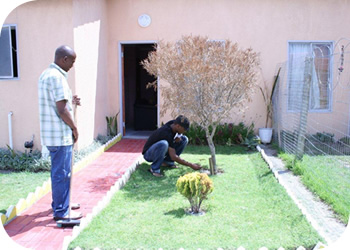Owning Your New Home

- What payments do I need to make in order to retain ownership of my house?
- What if I experience financial difficulties?
- Can I sell my house?
- Your title deed
- Insurance and the homeowner
- The importance of having a will when you are a homeowner
- Monthly home loan instalments, if you have a home loan from a bank.
- Monthly service charges - this is the cost of the water and electricity used.
- Basic monthly municipal rates, for example, for street cleaning, refuse collection, street lighting, storm water drains and sewerage pipes.
- Monthly insurance premiums for building and household content cover.
- If you are unemployed or receive an old-age pension you may approach your municipality and apply for the indigent grant.
- If you do not want to stay in the house, the municipality will take it back and allocate it to the next person on their waiting list.
- Do not sell your house within the first eight years without approval from the Department of Human Settlements or your municipality, as you will not qualify for future assistance from government.
- If you are a homeowner who has received a government subsidy, you are not allowed to sell your house for a period of eight years. Thereafter, if you wish to sell it, it would be possible to do so for much more than the original subsidy amount.
- Selling a house without a title deed is considered to be illegal.
- If you sell the house illegally, you will never again qualify for government assistance.
Other important things to know
- Your title deed - the document that proves your legal ownership of your property is filed at the Deeds Office.
- If you have a mortgage loan from a bank, your bank will hold the title deed as a security for your mortgage loan until you pay off your loan.
You need insurance in case something goes wrong structurally with your house, for example, your roof is blown off or the house is damaged in a fire.
When you take out insurance, ask the broker questions about the type of risks the insurance will cover.
For example:
- If my roof is blown off, will I be covered?
- If my windows get knocked out by a burglar, will I be covered?
You are however personally responsible for general maintenance and repairs to your house.
During your lifetime you collect valuable articles, such as your house. These are your assets. You also incur debts - these are your liabilities. They do not cease to exist when you die.
Your estate consists of all your assets and liabilities. By drawing up a will you ensure that you dictate what happens to your estate when you die.
If you die without a will, that is, you die intestate, the Master of the High Court will appoint an executor to administer your estate.
Ensure that your will is updated and that the original document is kept in a safe place.
In your will you can indicate who should inherit the house, or if the house must be sold and the money divided among your beneficiaries.


